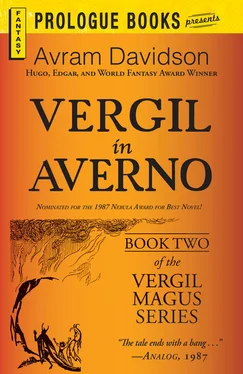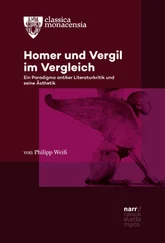Avram Davidson - Vergil in Averno
Здесь есть возможность читать онлайн «Avram Davidson - Vergil in Averno» весь текст электронной книги совершенно бесплатно (целиком полную версию без сокращений). В некоторых случаях можно слушать аудио, скачать через торрент в формате fb2 и присутствует краткое содержание. Жанр: Фэнтези, на английском языке. Описание произведения, (предисловие) а так же отзывы посетителей доступны на портале библиотеки ЛибКат.
- Название:Vergil in Averno
- Автор:
- Жанр:
- Год:неизвестен
- ISBN:нет данных
- Рейтинг книги:3 / 5. Голосов: 1
-
Избранное:Добавить в избранное
- Отзывы:
-
Ваша оценка:
- 60
- 1
- 2
- 3
- 4
- 5
Vergil in Averno: краткое содержание, описание и аннотация
Предлагаем к чтению аннотацию, описание, краткое содержание или предисловие (зависит от того, что написал сам автор книги «Vergil in Averno»). Если вы не нашли необходимую информацию о книге — напишите в комментариях, мы постараемся отыскать её.
Vergil in Averno — читать онлайн бесплатно полную книгу (весь текст) целиком
Ниже представлен текст книги, разбитый по страницам. Система сохранения места последней прочитанной страницы, позволяет с удобством читать онлайн бесплатно книгу «Vergil in Averno», без необходимости каждый раз заново искать на чём Вы остановились. Поставьте закладку, и сможете в любой момент перейти на страницу, на которой закончили чтение.
Интервал:
Закладка:
And Fulgence bowed. And Fulgence said no more.
Vergil and the mare were a ways down the street when he realized that there were three of them. The youngest stable boy had helped put on the horse-furniture, and then withdrew; now here he was again. “Thank you, boy, I shan’t need you,” Vergil said, sifting out a small coin.
“Ah, master, but I shall need you, ” the stable boy said firmly. “He’ve kicked me out, old popeyes have, for that I didn’t bring him back no louse.” Likelier (thought master), likelier Fulgence, having still some small matter in the debit column, had paid it by this small act of anger — and better than to have kicked a horse. Or. . but. . “I suppose he’d liked me to fetch it back in me armpit or me crouch. And I shan’t get no other job in no other stable, sir, for they’ve got as it be a guild, and without the old boss gives his leave no new boss durst take you on. Leastly such a young chap as me. Therefore.”
He said no further word, but marched sturdily along by the side of the mare. Nor did Vergil.
If the lad had not already learned that they were going to Averno, soon he would.
The famous sunshine of the great Bay was absent the morning of their departure, veiled in a sour drizzle of rain and smoke. The boy Iohan sniffed, and liked it not, despite the felt capes provided for them both. “The gods might have waited a bit,” he said. “For we shall soon enough have much such weather, where we go. As master knows, I’m sure.” He was a moment silent, then added, in a flat voice, “Very rich.”
Vergil understood. It was said that the city of Averno had two unofficial mottoes; one was Money Never Stinks , a mere pleasantry (for Averno, a mere pleasantry); but the other, Thou Shalt Want Ere I Shall Want , gave pause for much thought. And there was also the matter of its official municipal appellation. The descriptives of cities were customarily twofold, with both adjectives preceded by the word very; there were exceptions, of course, and Rome, of course, had none. . needed none. . and Avignon, the co-capital, was termed the Imperial and Pleasant There might perhaps be a distinction between “pleasant” and “very pleasant,” but none between “imperial” and “very imperial.” Amalfi was the Very Free and Very Faithful, perhaps a contradiction in terms; and Sevilla was termed Very Ancient and Very Wise.
And so on. And so on.
But Averno was, very simply, Very Rick.
Which nobody would deny.
For a moment the mare, Prima, paused at the crest of the surrounding hills. The mare turned her head to look at the Bay of Naples, then it rolled an eye and looked at Vergil: and the look in that eye reminded him at once so strongly of the Matron Gunsedilla that he had to check himself — there on the sun-warmed summit — from murmuring, “Yes, madam. It was very well done, madam.” The mare rolled the eye back, hunched a bit, plodded on. Vergil smiled. They had told him that the mare had her little humors.
The Matron Gunsedilla, who was she? she was a knight’s widow. She was also a witch. There were those who, having devoted more time to old wives’ tales than to wives, old or young, believed that every witch had a white chin-beard and dwelt in a clearing in the woods, crouching by midnight over a caldron on a fire. Gunsedilla was still on the brighter side of thirty, her middle age a bit more than a lustrum off, and she had no children; neither had she a beard, though to be sure there was a very slight dark down upon her upper lip, not enough to attract Spaniards, though. Her late husband had left her a mansion in the city, a villa in the suburbs, three latifundia in the country, olive orchards and an oil-press, as well as such other legacies as interests in several ships and some blocks of tenements. Her only appearance at a clearing in the woods would be to pick mushrooms on a picnic. She needed, of course, neither spin nor weave, nor wash wool and linen by the brook. In part she spent her time in pious devotions at home and at the temples, she brought soup and sop to the pauper sick, and broken victuals as well; and her readings from Homer were a feature of the town, her reader being a learned Greek with a mellifluous voice and a keen sense of grammar and rhythm. And what she did if she crouched at midnight was her own affair. As at midafternoon.
Still, time hung heavy on her hands, and, not wishing to fall into idle ways, she had some while since betaken herself to studies such as would stimulate her supple mind: first geometry, then geomancy; then, by a natural progression, sorcery — of, of course, the benevolent sort, the other sort being naturally illegal. She was of great help in recovering lost objects, she would be of no help at all in helping them in getting lost. Her command over the contents of Macer’s Concerning Those Made Impotent Through Sorcery was profound, though she would herself do nothing to cause anyone to become impotent through sorcery. As for her efforts in moon-constructs, gentle and sweet Selena must have smiled on them and her as she bent close to the lunar reflection in the burnished mazer and the dark-bottomed wooden pan; rustics who would not have known a burnished mazer had one bitten them in the buttocks would murmur at sight of the matron or even mention of her name, “Ah, the Madame Gunsedilla, she can draw down the moon from the heavens! Aye, haul it down from the starry skies!”
Now and then Vergil would not mind a short visit of an afternoon to discuss this work and that with her, and she was very far from minding, either; and now and then he would take a seat at the reading from Homer. Why only now and then in either matter? Why, that the matron was inclined to be just a bit, just the slightest bit, importunate; she did not exactly fish for compliments, rather did she slightly nudge for them; how well he knew the roll of those large eyes. . and how well he knew that, did he not at once bow a bit and smile a bit and look impressed a bit and murmur, “Yes, madame. It was very well done, madame,” rather (he had once thought) like a butler approving the catering arrangements — why, then see that fine and mobile mouth with its slightly downy upper lip draw out and draw down in discontent, see that still-supple body give a rather unpleasant hunch of annoyance. A twitch. A shrug.
Life contained enough of toil, of pain, and folly, and he felt that these echoes or simulacra of such, however faint and petty, were hardly worth. . well, experiencing. Often.
All this had passed across his mind like the faintest of shadows, and whither he now turned his eyes he saw a deeper shadow yet.
Averno lay beneath them, so near that they could identify individual houses, yet so far by reason of the wandering way through the craggy hills that it might be near sundown before they arrived. And some such thought evidently being in the mind of Iohan, he muttered, “Smell thee in the dark …” and broke off to break off a piece of his bread and scatter a crumble, and mumble, “Hither for this offering, ye genius loci.” He who has cautioned us that art is long and life is brief has also reminded us that airs, waters, and places have powers of their own.
The genius loci did not at once visibly smile, and it would have been difficult to say how such a sign of favor would be manifest in that region, but at least at no time as they wound round and round and sometimes, briefly, up, but mostly always down — at any rate, at no time did any rock fall upon them, nor any lip nor barm of a tight trail give way beneath them. For a while yet there stayed some trace in their nostrils of what the poet Andersius has called “the sweet salt air;” scarcely were they aware of this when the wind went tepid and dull, and then a warm sullen slap of stale breeze in their faces gave notice of what was to come. . and, fortunately, it came slowly and in stages. The heat and stench were Averno’s curse, yes, but they were the inevitable results of Averno’s blessing, too, for the hot places of the earth, elsewhere buried deeply, were here very near the surface. Here waters bubbled boiling up with no fuel placed beneath them, and here mounds rose anvil-high and anvil-iron-red and hot-white-hot without the need for charcoal, wood, or bellows -
Читать дальшеИнтервал:
Закладка:
Похожие книги на «Vergil in Averno»
Представляем Вашему вниманию похожие книги на «Vergil in Averno» списком для выбора. Мы отобрали схожую по названию и смыслу литературу в надежде предоставить читателям больше вариантов отыскать новые, интересные, ещё непрочитанные произведения.
Обсуждение, отзывы о книге «Vergil in Averno» и просто собственные мнения читателей. Оставьте ваши комментарии, напишите, что Вы думаете о произведении, его смысле или главных героях. Укажите что конкретно понравилось, а что нет, и почему Вы так считаете.












